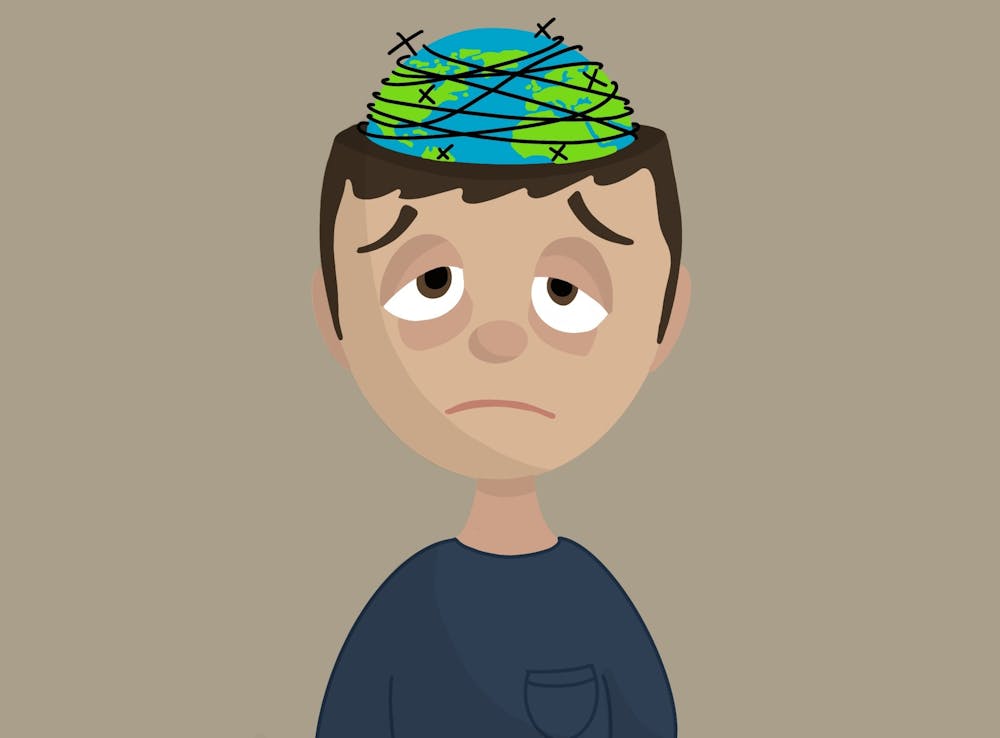The University community is no stranger to crises — from the ongoing pandemic to the effects of the Ukraine conflict, continuous calamities have taken a toll on the student psyche and have led many community members to experience numbness, anxiety, exhaustion and an overwhelming sense of grief.
In the modern era, oversaturated media has exacerbated this fatigue by preventing respite. From Instagram infographics on Russian aggression to TikToks of refugee life, people are becoming increasingly burned out by just opening their phones. As the distressing events pile up, some students find themselves in need of an outlet.
Second-year Architecture student Arien Assadi is extremely familiar with crisis as an Afghan-American paying close attention to the Taliban’s recent takeover of Afghanistan — which took place after the U.S. military withdrew from the country in August, allowing the Taliban to acquire Kabul and other large cities. While the situation now lacks the coverage it once held, community members are still reeling from the effects.
“I've kind of just tried my best not to expose myself to violent videos and the news as much just because I was so involved with the Afghan situation,” Assadi said. “I felt guilty and scared for my family. And now, all this is repeating again with Ukraine. I feel like it never ends, like it’s not real.”
In response to crises, many people use coping mechanisms to manage chronic stress. However, issues arise when people practice unhealthy or maladaptive coping strategies — such as avoidance techniques or substance abuse — that can prevent people from living their “normal” lives in the long term. Clinical psychologist Jennifer Kim Penberthy explained that these maladaptive mechanisms hold unforeseen consequences.
“In the long term, maladaptive coping strategies usually lead to more complications of interpersonal conflict and worsening moods,” Penberthy said. “I really advocate for people to try and use healthy coping strategies. We can reach out to other people and talk in a productive way, and we can do something healthy and empowering instead.”
Assadi said she has found Counseling and Psychological Services on Grounds to help her manage stress.
“Just talking to someone and knowing that you’re not alone, even if you feel like you don't necessarily need professional help, helps either way,” Assadi said.
While coverage on such events comes and goes, humanitarian disasters are here to stay. These events may leave students requiring additional mental support. Kirsten Gelsdorf, director of global humanitarian policy at the Frank Batten School of Leadership and Public Policy, is familiar with this global phenomenon.
“There's actually a humanitarian crisis with a global response happening in over 60 countries around the world and these crises are equally complex with the human suffering we're seeing in Ukraine,” Gelsdorf said.
Professor Gelsdorf recommended LPPS 3295: Global Humanitarian Response, a course she will be teaching in the upcoming fall semester, as a potential avenue to gain perspective on these areas. The class covers the pandemic, climate change and global conflicts that often make up crisis fatigue.
Community members have already shown an ability to break away from this stupor. A vigil was held by members of the Second Year Council with the aid of the Slavic Department, First and Third Year Councils and Fourth Year Trustees. This event not only raised donations and awareness, it also united the University community in feeling compassion.
“Compassion is beyond empathy and extending compassion, compassion for yourself and compassion for other people, is also a form of love,” Penberthy said. “And I know it might sound hokey, but I think that's what's going to overcome hatred. And all that we're seeing is love, love for ourselves and love for each other.”
This extension of empathy and ability to come together is one of the keys to fighting fatigue caused by ongoing exposure to tragedy. Both Gelsdorf and Penberthy noted the Contemplative Sciences Center as a resource for humanitarian aid workers to build resilience and combat burnout as well as for students to gain more understanding within themselves.
While engaging oneself is important, Gelsdorf said many community members have the privilege to be able to lend support to others as well as themselves. A way to do this is to gain the skills, knowledge and ethical backing to engage in issues for years to come. This can be through taking certain courses to educate oneself or to set money aside for annual donations to places in need.
“Harness this global compassion or engagement and sustain that for a longer term engagement,” Gelsdorf said. “One year from now, make a pledge to reinforce and re-see where [we] can support populations who are still in need.”
While the University community lends a hand to those in need, it may be time for students to take a moment to rest. A solution may be as simple as turning off the news when it begins to pile up or taking a mental health day when everything starts to become overwhelming.
“There is this idea of giving yourself permission, because it's important to do this on purpose,” Penberthy said. “To say, you know, I am intentionally making a choice, I feel numb, I want to help. And right now, I'm so numb, I need to just take care of me.”







